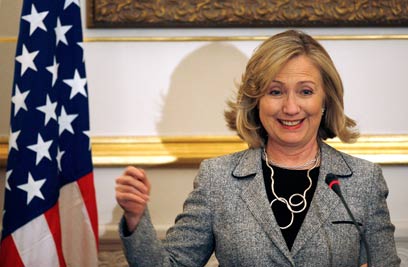
Clinton: Egypt revolution must produce democracy
US secretary of state urges Egypt to complete transition to democracy, promises financial aid; student group declines invitation to meet with Clinton 'because of her negative attitude toward revolution in the beginning'
US Secretary of State Hillary Rodham Clinton implored Egyptians on Tuesday to complete their fragile and unfinished democratic transition while fighting continued next door in Libya, and Bahrain called in foreign security forces to put down anti-government protests there.
Fearing that gains made since last month's ouster of authoritarian President Hosni Mubarak may be lost to impatience or a hijacking of the political system by extremists, Clinton urged Egyptians to seize the opportunity to make their country a model for an inclusive Arab democracy.
"To the people of Egypt, let me say: This moment of history belongs to you," Clinton said following talks with Egypt's new foreign minister, Nabil Elaraby. "This is your achievement and you broke barriers and overcame obstacles to pursue the dream of democracy."
She called on Egypt to use its millennia-old traditions of civilization and innovation to ensure the success of their peaceful revolution.
"Today, because of the Egyptian people, Egypt is rising. Egypt, mother of the world, is now giving birth to democracy," Clinton said. "We congratulate you on embarking on what will be a very important next chapter in the storied history of Egypt."
The US sees Egypt as a potential vanguard for reform throughout the region and is eager not to allow developments in Libya, Bahrain or elsewhere, including Yemen, disrupt it.

'Prepare for free, fair elections.' Clinton in Cairo (Photo: AP)
Speaking besides al-Araby, Clinton said the US understood the urgency of the situation in Libya, where forces loyal to Muammar Gaddafi are reclaiming territory from rebels in heavy fighting. She also expressed grave concern about developments in Bahrain where the Sunni monarchy has asked Sunni-majority neighbors in the Gulf to help it deal with an uprising by Shiites, who are the majority in Bahrain.
Making her first visit to what she called the "new Egypt," Clinton said the country's path to elections and greater freedom will be hard work but that America will help.
She unveiled details of an economic support package aimed at helping to create badly needed jobs, mainly for Egypt's exploding youth population, and spur foreign investment. In addition to an already announced $150 million being redirected to the transition and financial sector, the aid will include tens of billions of dollars in credits and private sector loans as well as the expansion of Egyptian facilities that are able to send duty-free exports to the United States.
'Non-violence must be embraced'
While trying to help Egypt resolve some of its most critical economic woes, Clinton pleaded with Egypt's transitional authorities, as well as private civic groups that played a leading role in the Mubarak protests to embrace reform guided by two key ideas: non-violence and national unity. "Those two principles must be embraced through the transition by all parties, to ensure a future of security and democracy for the Egyptian people," she said.
She applauded an announcement Tuesday of further dismantling of the hated state security apparatus and said Egypt now needs to prepare for free, fair elections to produce "leaders that will be able to respond to (your) aspirations."
Clinton was the first US cabinet-level official to visit Cairo since the fall of Mubarak, a staunch US ally for more than 30 years and the first secretary of state to visit a non-Mubarak-led Egypt since Alexander Haig in 1981.
Decades of close ties between Mubarak and successive American presidents have left many Egyptians suspicious of US motives, particularly after the Obama administration appeared slow to back the protesters.
Group refuses to meet Clinton
One student group said it had declined invitations for some of its members to meet with Clinton while she is in Cairo. "Based on her negative attitude toward the revolution in the beginning and the positions of the American administration in the region, the invitation has been refused," the Revolution Youth Coalition, which groups various movements involved in organizing the protests, said in a statement.
After her meeting with the foreign minister, Clinton saw several dozen rights activists, women's leaders and students to ask them where they thought the transition stood and what help they might need from the US.
They expressed concerns about the timing of an upcoming referendum on constitutional amendments and parliamentary elections in June to be followed by a presidential vote. Some believe the sequencing does not allow enough time for the opposition to organize into credible political parties. Others are concerned at possible heavy-handed tactics from the military.
On Wednesday before leaving for Tunisia, where she will have similar meetings with transition leaders there, Clinton is to see the chief of Egypt's powerful Armed Forces Supreme Council, Field Marshal Hussein Tantawi, and interim Prime Minister Essam Sharaf.
She will also hold a town hall meeting with students, educators and others.
- Follow Ynetnews on Facebook










